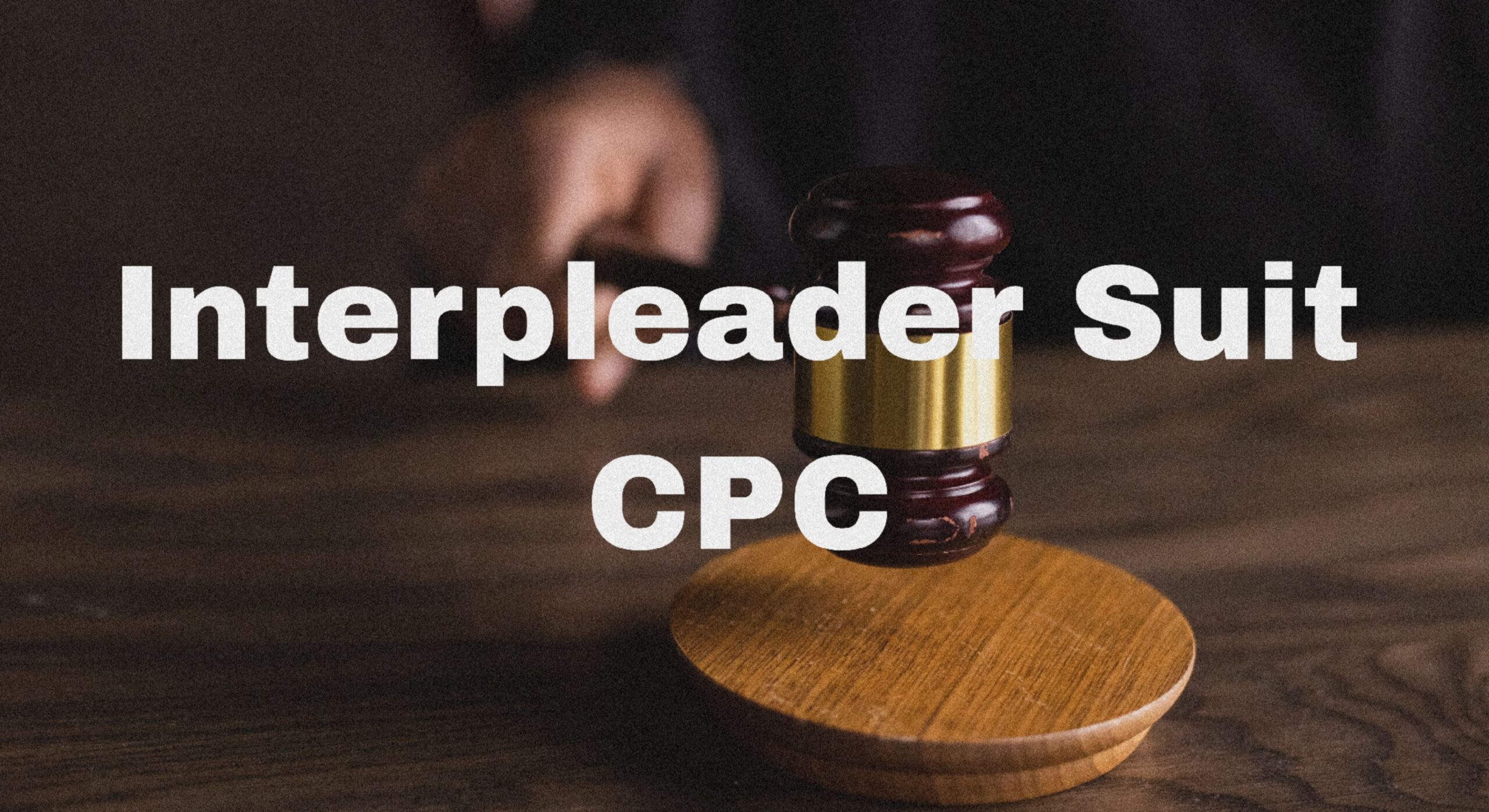Table of Contents
The interpleader suit is based on the Interpleader Doctrine, which evolved in Britain. It allows a person facing conflicting claims to seek a determination of liability to one or several claimants.
What is an Interpleader Suit?
An interpleader suit is a legal proceeding that arises when a person (the plaintiff) faces conflicting claims from multiple parties (the defendants) regarding a specific subject matter (such as money, debt, or property). The purpose of an interpleader suit is to determine which claimant has the legitimate right to the disputed subject matter.
Scenario and Example:
Imagine a situation where a person (let’s call them A) owes money to another person (B), but B passes away before the payment is due.
- Now, two individuals (C and D) both claim to be the legal heirs of B and demand payment from A.
- A wants to make the payment but is unsure whom to pay.
- In this scenario, A can file an interpleader suit in court, asking C and D to establish their respective claims.
Order XXXV Rule 1 – Plaint in interpleader-suit
In addition to the other statements necessary for plaints, the plaint must state the following:
(a) The plaintiff claims no interest in the subject-matter in dispute other than for charges or costs.
(b) The claims made by the defendants severally.
(c) There is no collusion between the plaintiff and any of the defendants.
In simpler terms, the plaintiff must state that they have no interest in the subject-matter in dispute other than for charges or costs. They must also state the claims made by the defendants and confirm that there is no collusion between the plaintiff and any of the defendants.
Order XXXV Rule 2 – Payment of thing claimed into Court
When someone claims something in court, like money or property, they might need to actually give that thing to the court or put it under the court’s care. Only after doing so can they ask for any specific orders related to their case.
In simpler terms: If you want something from the court, you might have to hand it over first.
Order XXXV Rule 3 – Procedure where defendant is suing plaintiff
In simpler terms, this is a procedure where a defendant in a certain type of lawsuit (called an interpleader suit) is also suing the plaintiff about the same subject matter. If this happens, the court where the lawsuit against the plaintiff is happening will pause (or “stay”) the proceedings once it learns that an interpleader suit has been filed.
The defendant’s costs in the paused lawsuit can be covered in the interpleader suit. However, if these costs are not fully covered in that suit, they can be added to the defendant’s costs in the interpleader suit.
Order XXXV Rule 4 – Procedure at first hearing
- At the first hearing, the court can do one of two things:
- (a) It can state that the person who brought the case (the plaintiff) is not responsible for anything related to what they’re claiming. The court can then award them their legal costs and remove them from the case.
- (b) If the court thinks it’s fair or necessary, it can keep all parties involved until the case is completely resolved.
- If the court can make a decision about who owns the thing being claimed based on what everyone admits or other evidence, it will do so.
- If the court can’t make a decision based on what everyone admits, it can:
- (a) Set up a question or questions to be answered through a trial.
- (b) Make any person making a claim a plaintiff instead of or in addition to the original plaintiff.
Order XXXV Rule 5 – Agents and tenants may not institute interpleader suits
- Agents or tenants can’t start interpleader suits. This means they can’t sue their bosses (for agents) or landlords (for tenants) to force them to get involved in a dispute with other people. But this only applies if those other people are claiming something through the bosses or landlords.
Here are two examples to illustrate this:
- A gives B, his agent, a box of jewels. C says A took these jewels from him wrongly and wants them back from B. In this case, B can’t start an interpleader suit against A and C.
- A gives B, his agent, a box of jewels. A writes to C to use the jewels as a security for a debt A owes to C. Later, A says C’s debt is paid off, but C disagrees. Both A and C want the jewels from B. In this case, B can start an interpleader suit against A and C.
Order XXXV Rule 6 – Charge for plaintiff’s costs
If a lawsuit is filed correctly, the court can cover the original plaintiff’s (the person who started the lawsuit) expenses. This can be done by placing a charge on the item that’s being claimed in the lawsuit or through some other effective method. This means the plaintiff might get paid back for their costs from the value of the item they’re claiming, or the court might find another way to ensure they’re compensated.
Essential Elements of an Interpleader Suit:
Liability or Conflict: There must be a liability, a sum of money, or other movable/immovable property in dispute.
Multiple Claimants: Two or more individuals must be making adverse claims against each other. Plaintiff’s Position:
The plaintiff should not have any interest in the subject matter other than necessary charges incurred in filing the suit.
No Collusion: There should be no collusion between the plaintiff and any of the defendants.
Payment into Court: If the disputed thing can be paid into court or placed in court custody, the plaintiff may need to do so before seeking any order in the suit.
When Can an Interpleader Suit Be Filed?
Under Section 88 of the Code of Civil Procedure (CPC):
If two or more persons have adverse claims over money, debt, or property. Such a person (the plaintiff) can file an interpleader suit.
- Conditions:
- The plaintiff must not claim any interest apart from necessary charges.
- The former claimants become defendants in the suit.
In summary, an interpleader suit helps resolve conflicting claims by allowing all parties to present their cases and determine the rightful claimant. It prevents a person from being liable twice due to competing demands.
FAQs
1. What is an interpleader suit?
An interpleader suit is a legal proceeding initiated by a person facing conflicting claims from multiple parties regarding a specific subject matter, such as money, debt, or property. It aims to determine which claimant has the legitimate right to the disputed subject matter.
2. When might someone consider filing an interpleader suit?
Someone might file an interpleader suit when they owe money, debt, or property to a party who passes away before the payment is due, and multiple individuals claim to be the legal heirs and demand payment.
3. What are the essential elements of an interpleader suit?
The essential elements include the existence of a liability or conflict, multiple claimants with adverse claims, the plaintiff having no interest in the subject matter other than necessary charges, and no collusion between the plaintiff and any defendants.
4. What does it mean to “pay into court” in an interpleader suit?
It means that if the disputed thing, such as money or property, can be paid into court or placed in court custody, the plaintiff may need to do so before seeking any orders in the suit.
5. Can anyone file an interpleader suit?
According to Section 88 of the Code of Civil Procedure (CPC), if two or more persons have adverse claims over money, debt, or property, such a person (the plaintiff) can file an interpleader suit.
6. What happens if a defendant in another lawsuit also sues the plaintiff about the same subject matter in an interpleader suit?
The court where the lawsuit against the plaintiff is happening may pause the proceedings once it learns that an interpleader suit has been filed. The defendant’s costs in the paused lawsuit can be covered in the interpleader suit.
7. What happens at the first hearing of an interpleader suit?
At the first hearing, the court may either relieve the plaintiff from any responsibility regarding the claimed subject matter or keep all parties involved until the case is resolved. If necessary, the court may set up questions for trial or make any person making a claim a plaintiff.These FAQs provide a broad overview of interpleader suits and address common questions that individuals may have about the process.

